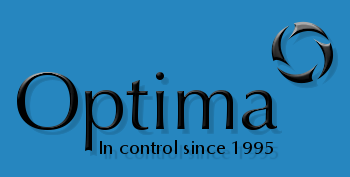To receive our latest whitepapers in your email box, please, subscribe to our monthly newsletter. If not happy with what you read, you will be able to unsubscribe at any time.
Or visit our newsletter archive to find out plenty of useful information.
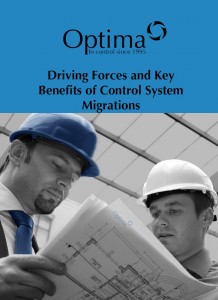 |
Driving Forces and Key Benefits of Control System Migrations
October 21th, 2013
Migrating a control system from one technology to another implies using different fundamental technologies at the heart of the control system. For example, using new AC motor and drive technology rather than an existing DC, or acquiring sensor data over Fieldbus networks rather than relying on long-distance hardwired interconnectivity.
In business most questions must satisfy a commercial rationale. Any monetary investment needs to have justification with a confidently predicted return on that investment. So what improvements can be reasonably expected from the decision to migrate? In this whitepaper, we answer this question for a few of the more frequently undertaken migration projects.
 Download Full Report Download Full Report
|
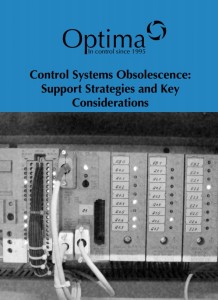 |
Control Systems Obsolescence – Support Strategies and Key Considerations
July 29th, 2013
Naturally, robust steel frameworks of machines age much more slowly than their moving parts and also have an extremely long life span if well-maintained. However, with those same machines’ control systems the case is different. Modern technology advances so quickly that a system can be out of date in as little as 10-12 years.
In this article, Michael Hill, managing director of Optima Control Solutions, looks at three different manifestations of control system obsolescence and offers practical advice on how to deal with each case. The last part of the article contains a checklist of the key factors to consider before moving forward with any obsolescence support strategy.
 Download Full Report Download Full Report
|
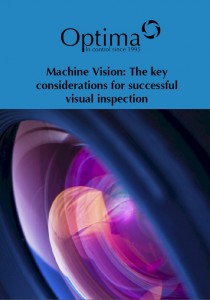 |
Machine Vision: The Key Considerations for Successful Visual Inspection
June 14th, 2013
There is no such a thing as an “off-the-shelf” vision system. Just like a drive- or a PLC-based control system, each one is unique and each one is engineered and thought about. The customers’ objectives may be similar to each other as to what they want to achieve with visual inspection. This is why some people think vision is a simple, one-fits-all solution when, in fact, it is not.
There are two critical elements in any successful vision system: lighting and the selection of vision technology used. The correct determination of these two system components is crucial and is helped enormously by, at the project outset, producing a good specification document and performing preliminary trials with real samples of the vision system’s target products. We herein consider some options to be considered regarding the two critical elements.
 Download Full Report Download Full Report
|
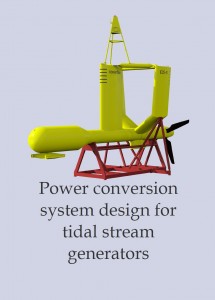 |
Power conversion system design for tidal stream generators
May 1st, 2013
Generating energy from ocean tidal flow is an emerging technology which could contribute between 6GW to 12GW of clean power to the renewable energy mix in the UK. Tidal flows are highly predictable and the power generation cycle can be calculated years in advance. However, there are many technical challenges that must be overcome before placing electrical generating devices in the hostile marine environment. This report describes the development of a power conversion system to capture energy with a floating horizontal axis tidal stream generator.
 Download Full Report Download Full Report
|
 |
Demand Project Quality to Ease Maintenance and Reduce Cost of Ownership
February 11th, 2013
Once a control system project is completed, its ownership transfers to the customer and their production & engineering staff. From that point on, ease of maintenance and cost of ownership kick in. This long period of responsibility for the machine control system is often not fully considered during the procurement process. Two simple measures can optimise the ownership experience for customers and suppliers alike and both actions will maximise the quality of project engineering – allocated sufficient budget & realistic timescales.
 Download Full Report Download Full Report
|
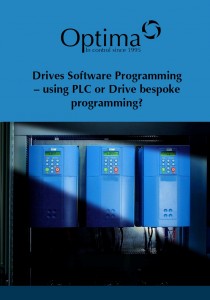
|
Drives Software Programming – using PLC or Drive bespoke programming?
September 14th, 2012
Many drive manufacturers such as Siemens and Parker SSD have developed application software that is designed to meet most common drive applications and control requirements. However, it is not unusual for certain projects to require bespoke software to be written.
One frequently asked question with applications of this nature is, “Should one use the drive’s internal programming blocks or write one’s own blocks in the PLC to control the machine?”
Given that there are two possible solutions, some experience is necessary if the best decision is to be made.
 Download Full Report Download Full Report
|
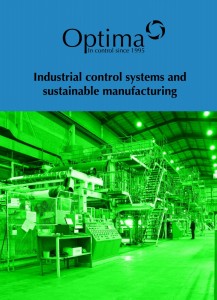
|
Industrial Control Systems and Sustainable Manufacturing
June 25th, 2012
This report aims to discuss the main indicators of sustainability and to explain why sustainability is a huge problem in the manufacturing sector. The second part of the whitepaper features the opinions Optima gathered from professionals in the plastics and packaging industries. They have shared their views on how sustainable control system refurbishments are compared to new machinery purchases.
 Download Full Report Download Full Report
|
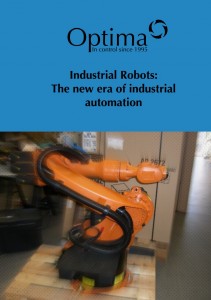 |
Industrial Robots: The new era of industrial automation
May 14th, 2012
This report aims to summarize how industrial robots are designed, programmed and applied in production settings. In the second part of the report Stephen Carradice, design engineer at Optima Control Solutions, discusses some practical considerations involved in the application of these powerful robots. He explores how the robot controls are integrated with the control system of a host production plant and what the technical challenges are in doing so.
 Download Full Report Download Full Report
|
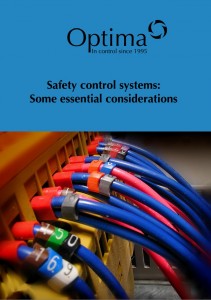 |
Safety Control Systems: Some Essential Considerations
April 3rd, 2012
Automated control systems are the backbone of modern production. It is hard to imagine engineering a manufacturing process without the help of a specialized computing system. This is where Programmable Logic Controllers (or PLCs) are significant. The choice of a PLC brand, therefore, is not a simple decision to make because that can affect the productivity of a whole process line. The first part of this report describes the basic principles and architecture of a programmable logic controller. The second part provides short comparisons of 3 PLC brands. The final part is a debate between Optima’s senior engineers about the various benefits of each PLC brand (focusing particularly on Siemens and Allen Bradley). Ian Brady and Nick Maclean offer two different views on the pros and cons of the products of the two main PLC manufacturers.
 Download Full Report Download Full Report
|
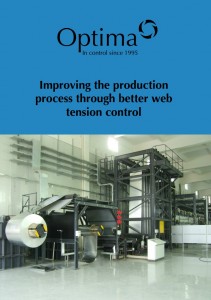 |
Improving the Production Process Through Better Web Tension Control
February 20th, 2012
Good web tension control systems ensure that no matter how demanding the production process is, the correct web tension is maintained for any type of material, at any point of the machine and at any speed. In this article, Optima cover the two popular types of closed-loop tension controllers – dancer mechanisms and electrical load cell transducers.
 Download Full Report Download Full Report
|
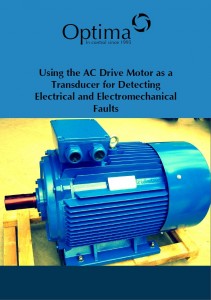 |
Using the AC Drive Motor as a Transducer for Detecting Electrical and Electromechanical Faults
January 9th, 2012
This report is based on Mark Lane’s research for the University of Huddersfield and concerns motor condition monitoring, preventative maintenance and their commercial implications.
There is significant interest from industry in motor and mechanical sub-system condition monitoring– as shown in the work commissioned for David Brown[see report]. The customers of Optima Control Solutions Ltd. have regular vibration analysis checks carried out on key plant equipment. Often, this has shown to be valuable in detecting early failures.
 Download Full Report Download Full Report
|
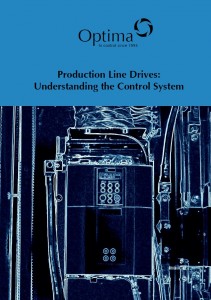 |
Production Line Drives: Understanding the Control System
November 11th, 2011
This report aims to familiarize the reader with basic but important information about two specific types of controllers – DC drives and AC drives. The first part provides descriptions of the general working principles of variable speed drive (VSD) technology. It discusses their main advantages and disadvantages between AC and DC drive solutions. The second part explains some problems that could possibly be encountered when employing AC or DC drive systems and offers practical recommendations about how to approach these problems. Dr Adrian West, Optima’s technical director, has spent more than 30 years working with, programming and troubleshooting drive systems. This report is based on his extensive practical knowledge and experience. It is, therefore, a very accurate and independent source of information.
 Download Full Report Download Full Report
|
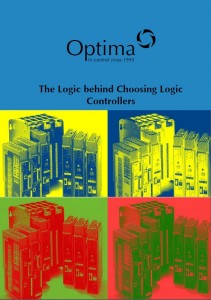 |
Programmable Logic Controllers – Benefits and Applications
October 3rd, 2011
Automated control systems are the backbone of modern production. It is hard to imagine engineering a manufacturing process without the help of a specialized computing system. This is where Programmable Logic Controllers (or PLCs) are significant. The choice of a PLC brand, therefore, is not a simple decision to make because that can affect the productivity of a whole process line. The first part of this report describes the basic principles and architecture of a programmable logic controller. The second part provides short comparisons of 3 PLC brands. The final part is a debate between Optima’s senior engineers about the various benefits of each PLC brand (focusing particularly on Siemens and Allen Bradley). Ian Brady and Nick Maclean offer two different views on the pros and cons of the products of the two main PLC manufacturers.
 Download Full Report Download Full Report
|

